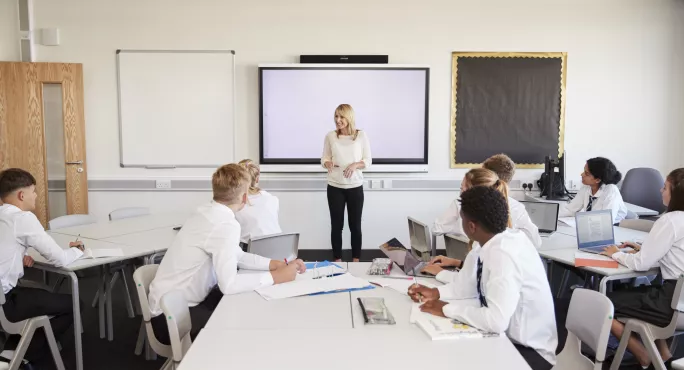- Home
- Why teachers need their headteachers to teach
Why teachers need their headteachers to teach

My first book was originally going to be called “Why headteachers have to be the best teacher in their schools”. It was a good decision to call the book Love over Fear instead, for myriad reasons, but that original title contained a grain of truth. If you are a teaching headteacher, you get to learn, first hand, what is impeding your colleagues from teaching as well as they possibly can. As Viviane Robinson so rightly asserts in her book Student-Centred Leadership, a teaching headteacher learns “in detail about the challenges the learners face and the conditions teachers require to succeed”.
My job, in the world of year group bubbles, social distancing and hand sanitiser, is to ensure that I eradicate anything that is making life harder for Huntington’s teachers. At the moment I only teach a period of Year 9 English, last lesson on Wednesday, and a double period of Year 13 economics A level on a Thursday morning. That morsel of teaching has, however, been illuminating. Here are five things I have learned about what has faced teachers at our school these past few weeks:
Coronavirus: The challenges teachers are faced with
1. Everything is heightened
In the current circumstances - where you might have, for the fourth or fifth time that day, walked 250 metres across the school site, pulling your mobile resource unit (aka, a store box on wheels) into a classroom where the students have already sat down and, once again you have had to summon up the energy to reclaim your authority over the room - the tiniest thing, which normally you would take in your stride, can tip you over the edge. In my first Year 9 lesson of the year (the previous lesson, straight after lunch, I had stepped in, with literally one minute’s notice, to cover a lesson for a colleague who needed some time out), a student, who was just fiddling with his pencil case in the front row, received a stern rebuke from me, the force of which was completely unwarranted and for which I apologised at the end of the lesson.
2. Hygiene measures are time-consuming
Remembering to leave enough time at the end of the lesson to allow students to wipe the desks with antibacterial spray, disposable cloths and rubber gloves, is a challenge. I had a couple of multiple-choice questions ready to test the recall of my economics students, when I realised that the last seven minutes of the lesson were needed for ensuring that the students had completed the cleaning rather than checking if they had advanced their learning.
3. It’s hard not to circulate
The instinct to walk around the room is hard to resist. In my economics lessons, I have to literally duck out of the way of the board because I am hemmed in by Year 13 students and I keep blocking their view. Ensuring the two-metre distancing is making rooms even smaller.
4. You can’t set remote work before the lesson
Uploading work for remote learners is best done at the end of the day, because one never knows how much you will get through in the lesson. In my first lesson of the year, I got less than a third done of what I had planned. Lessons are like that sometimes. A colleague also emailed me to say that the end of the day was better because it would be less pressured - a view that influenced my decision to set work from day two of absence for students self-isolating at home.
5. IT problems can ruin a lesson
The IT glitch that meant that PC screens kept freezing was damned annoying. In my first four lessons, the screen froze three times and the only solution was to restart the PC. Hard enough when you are the headteacher and all the advantages that designation brings - imagine if you are a modern foreign languages NQT, who did not finish his/her teaching practice as a result of the coronavirus outbreak and who hasn’t been in front of a class for over six months; who is teaching behind a strip of black and yellow tape two metres from the nearest student in a design technology room; who teaches a class of 33 Year 7s straight after wet lunch, and just as you had settled the class down and you were halfway through taking the register, the PC screen freezes. So, I had to get that fixed and we think, finally, the corrupt driver that was part of the new build on the PCs we had reconfigured over the summer, is at fault. By Wednesday it will be sorted.
Beyond walking the corridors and being on duty more times a day than any headteacher thought possible, getting in to teach so that we know what faces our teachers and students is incredibly helpful. It allows us to be more understanding of - and consequently more humane towards - our colleagues, who are busting a gut teaching 15 lessons or more on the bounce without a break, and commuting between every single one.
And sorting out the PC glitch becomes far more pressing when it is disrupting your own teaching…
John Tomsett is headteacher at Huntington School, York, and is co-author with Jonny Uttley of his latest book, Putting Staff First. A version of this article first appeared on his blog.
Keep reading for just £1 per month
You've reached your limit of free articles this month. Subscribe for £1 per month for three months and get:
- Unlimited access to all Tes magazine content
- Exclusive subscriber-only stories
- Award-winning email newsletters



